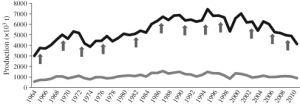Global Fishmeal and Fish-oil Supply
by Beau Marsh, RJD Intern
Fishmeal and fish-oil are global commodities produced for both animal and human consumption. These products are manufactured from whole fish catches, as well as the by-products of fish processed for human consumption. Fishmeal and fish-oil are utilized for livestock and aquaculture feeds, and fish-oil is being increasingly sought after by people for the omega-3 fatty acid content. In the review paper by Shepherd & Jackson (2013), information from the United Nations Food and Agriculture Organization (FAO) and the International Fishmeal and Fish-oil Organization (IFFO) is used to analyze the trends of fishmeal and fish-oil use. The data also suggests the role fishmeal and fish-oil will play in the future of animal and human consumption. In the past 50 years, fishmeal and fish-oil consumption has seen considerable change.

World fishmeal ( ) and fish-oil ( ) production for 1964–2011 ( , El Ni˜no years)(source: Shepherd & Jackson 2013).
Global production increased from the 1960’s until it peaked in 1995. Since 1995, there is a clear pattern of decreasing annual production.
Fishmeal and fish-oil predominantly come from forage fishes (i.e. whole fishes), while an additional portion come from the processed by-products of fishes caught for human consumption.
Fishmeal offers a nearly optimal diet for animal feeds. Its benefits were initially recognized for agricultural purposes. In 1960, agriculture constituted 98% of fishmeal consumption, splitting it between pig and poultry feeds. Aquaculture has grown to the dominant use of fishmeal and fish-oil. Presently, aquaculture has expanded to the point where it consumes over 73% of global fishmeal production.
In regards to fish-oil, its main purpose was for both margarines and shortenings or for various industrial uses. After fish farming began in the 1980’s, it has expanded to where aquaculture now consumes over 80% of global fish-oil production. In addition, fish-oils high in omega-3 fatty acids, notably eicosapentaenoic acid (EPA) and docosahexaenoic acid (DHA), are increasing in demand for human consumption.
With the growth of these emerging markets, there is a greater demand on the fishmeal and fish-oil industry. Due to recent, more stringent fisheries regulation, there is a reduced source of whole fishes available. Therefore, greater amounts of fish by-products are being incorporated into the final products, and marine ingredients in fishmeal compounds are becoming more expensive. A cost effective response has been to substitute in vegetable components and land-animal by-products as a cheaper source of proteins and lipids. This is not an ideal solution because of potential human health concerns such as transmissible spongiform encephalopathies (TSE). It also causes a diminishing effect on the fatty acid make-up of the fish.
Multiple approaches are being taken to solve the fact that the need for fishmeal and fish-oil continues to grow, but their production remains static or decreases. Possible future solutions may be genetically modified plants or transgenic farmed fish, both of which would render high levels of omega-3 fatty acids. However, genetic modification inevitably receives consumer criticism, so these techniques are unlikely in the near future. Another solution already underway is the use of other sources such as krill species and algal biomasses for the valuable oils. This should hopefully reduce some pressure on the omega-3 oil resources; however, the incorporation of vegetable oils continues to increase.
A separate issue affecting fishmeal and fish-oil resources is the lack of regulation and responsible management in Asian fisheries. These fisheries are among the world’s largest aquaculture producers, but decades of overexploitation have hurt production. Additionally, the regional practice of feeding with trash fish exacerbates the problem. Low-level trash fish causes the depletion of fisheries and diseases to spread throughout the fishes. These instances of poor management have triggered multinational agencies to work with local governments in order to implement healthier practices.
Every year fewer marine ingredients are available because of increased fisheries regulation and the increasing demand from aquaculture and human consumption markets. While it is fortunate to see responsible management implemented over fisheries, emergent challenges arise. These challenges have sparked innovation which has developed alternatives (some more controversial than others) to the forage fish supply. Substituting marine ingredients has proven to be efficient in aquaculture, but what are the implications for the end consumer? While the fish species may show successful growth, there are reduced levels of omega-3 fatty acids in the fishes. These oils can also be extracted from algae or krill, but it is less efficient. Fishmeal and fish-oils are valuable resources that require responsible and efficient management which without could mean compromising the health of human consumers and aquacultures.
REFERENCE
Shepherd, C. J. and Jackson, A. J. (2013), Global fishmeal and fish-oil supply: inputs, outputs and marketsa. Journal of Fish Biology, 83: 1046–1066. doi: 10.1111/jfb.12224







Extremely useful article! I am very much a Fish Oil person so this will go a long way in the diet and lifestyle. It seems Omega 3 Fish Oils are even used to treat Cancer and other so-called ‘incurable’ diseases so we definitely need more articles on this subject as it may be a life saver for many people!
I have used fish oil to help with a host of ailments like depression and anxiety. If people could only understand how well it works; and its completely natural too.
Thanks for the article Beau. Have you written any others that I can find?